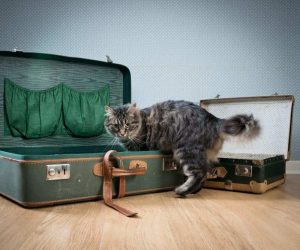Does Your Cat Miss You When You Leave the House?
What do our cats actually think when we leave the house? Do they miss us, or do they barely notice we're gone? Can they experience stress and anxiety? In this blog, we will explore these intriguing questions and provide three powerful tips to ensure your cat doesn't experience stress during your absence. Before we dive in, be sure to follow our blog and join our feline-loving community.
The Bond Between Cats and Owners
A study by Oregon State University delved into the attachment styles of cats, revealing that cats exhibit both secure and insecure attachments towards their caregivers. In this study, cats were observed in a secure base test where they were placed in an unfamiliar room with their owner, then left alone, and eventually reunited. The behaviour of the cats during the reunion phase was quite revealing. Cats with secure attachments appeared relaxed and continued to explore, occasionally returning to their owners for comfort. In contrast, those with insecure attachments displayed signs of stress, clinging to their owners or avoiding them altogether.
This discovery is groundbreaking in understanding the emotional depth of cats. It shows that cats aren't indifferent to their owners; the attachment they display is indicative of the trust and security they feel in their humans' presence. Interestingly, the study found that the percentage of cats with secure attachments to their owners is remarkably similar to that observed in dogs and human infants.
Do Cats Experience Separation Anxiety?
The popular image of a cat is that of an aloof, independent creature seemingly unbothered by their human companions. However, beneath this calm exterior, there could be a whirlwind of emotions that are often hard to decipher. Cats are not very demonstrative of their feelings, and this characteristic can make it particularly challenging for owners to discern when their cats are feeling stressed or anxious. But just because they aren't showing it overtly doesn't mean they aren't feeling the strain of separation. They form bonds with their caregivers, and any disruption to this relationship can impact their emotional well-being.
But how can one tell if a cat is truly grappling with separation anxiety? Look for subtle signs. A cat that is usually silent might start vocalising more when alone. There could be alterations in eating habits; some cats might consume less food, while others may do the opposite. These fluctuations in eating are often coping mechanisms to deal with the stress of solitude. Another indicative sign of stress is disruptions in toilet habits. A cat experiencing anxiety might start eliminating outside its litter box. This behaviour isn't a mark of rebellion; it's a clear indication of anxiety stemming from the owner's absence.
Certain cats, such as those with a history of rehoming or traumatic experiences, may be more susceptible to separation anxiety. Similarly, kittens that were separated prematurely from their mothers may exhibit increased sensitivity to changes.
What Do Cats Think We're Doing?
Research and observation offer us some fascinating insights into this matter. Cats live in the present; they’re not as concerned with the future or the past, which means they don't spend much time pondering where we might have gone. However, this doesn't mean they don't notice or care about our absence. Cats are observant creatures and are likely aware that their human companions do things differently from them, including leaving the house.
There’s a theory suggesting that cats might perceive us as bigger, non-hostile cats. This idea stems from the way cats communicate with us, using similar methods they employ with other cats. Given this, they might just think we are out doing "bigger cat" things when we leave the house. Although we can't know for certain what goes on in a cat's mind, their behaviour gives us clues. Some cats will watch us leave, maybe sitting by the window and observing as we step out. Others might give us a dismissive glance and go back to their nap. This variety in behaviour shows that while they might not understand the specifics of our departure, they do acknowledge it in their own way.
Interestingly, a cat's reaction to our departure can also be influenced by their bond with us. A cat with a strong attachment to its owner might exhibit signs of stress when they leave, possibly due to the change in environment and routine. On the other hand, a more independent cat might be less bothered, viewing our absence as just a part of their day. Some cats might relish the peace and quiet, while others may feel uneasy and anxious. The level of attachment a cat has to its owner can influence how it behaves when left alone. A securely attached cat might feel more at ease, while an insecure one might exhibit signs of stress and anxiety.
Three Powerful Tips
Here are three powerful tips that can significantly reduce the feelings of separation anxiety or stress your cat might experience when you're not around:
- Calm Departures and Greetings: One of the most straightforward yet effective measures is to maintain composure during your departures and arrivals. While it's tempting to make a big fuss saying a long goodbye or overly celebrating your return, it's best to keep things calm. When you remain calm and nonchalant about coming and going, it signals to your cat that these events are regular and not something to be overly concerned about.
- Gradual Desensitisation: Start by leaving the house for extremely short durations, just a few minutes, and then gradually increase the time you're gone. Over time, this will help your cat realise that your departures are temporary and that you always come back. This method can significantly lessen the impact of your leaving as it reinforces the idea of your inevitable return.
- Music or White Noise: Ambient sounds can have a calming effect on cats. Leaving soft music or a radio on in your absence can offer a sense of comfort. It serves as a gentle auditory distraction and can even replicate the ambient noise level when you're at home, making the house feel less empty. If you're planning to be away for an extended duration, hiring a pet sitter can be a game changer. A pet sitter not only ensures that your cat's basic needs like food and clean litter are taken care of, but they also provide much-needed human interaction. Playtime, gentle strokes, or just the mere presence of someone in the house can significantly minimise feelings of loneliness and anxiety in your cat. By hiring a professional or even asking a trusted neighbour or friend to check in, you offer your cat a familiar routine and a sense of normalcy even when you're not around.




Comments
Post a Comment